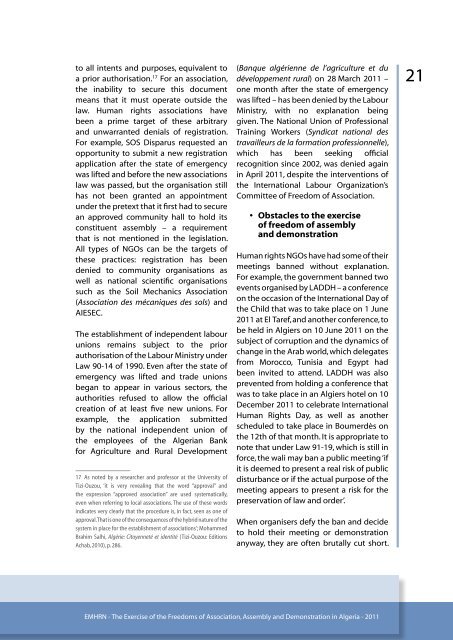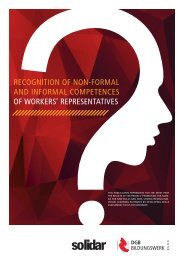Algeria - Solidar
Algeria - Solidar
Algeria - Solidar
You also want an ePaper? Increase the reach of your titles
YUMPU automatically turns print PDFs into web optimized ePapers that Google loves.
to all intents and purposes, equivalent to<br />
a prior authorisation. 17 For an association,<br />
the inability to secure this document<br />
means that it must operate outside the<br />
law. Human rights associations have<br />
been a prime target of these arbitrary<br />
and unwarranted denials of registration.<br />
For example, SOS Disparus requested an<br />
opportunity to submit a new registration<br />
application after the state of emergency<br />
was lifted and before the new associations<br />
law was passed, but the organisation still<br />
has not been granted an appointment<br />
under the pretext that it first had to secure<br />
an approved community hall to hold its<br />
constituent assembly – a requirement<br />
that is not mentioned in the legislation.<br />
All types of NGOs can be the targets of<br />
these practices: registration has been<br />
denied to community organisations as<br />
well as national scientific organisations<br />
such as the Soil Mechanics Association<br />
(Association des mécaniques des sols) and<br />
AIESEC.<br />
The establishment of independent labour<br />
unions remains subject to the prior<br />
authorisation of the Labour Ministry under<br />
Law 90-14 of 1990. Even after the state of<br />
emergency was lifted and trade unions<br />
began to appear in various sectors, the<br />
authorities refused to allow the official<br />
creation of at least five new unions. For<br />
example, the application submitted<br />
by the national independent union of<br />
the employees of the <strong>Algeria</strong>n Bank<br />
for Agriculture and Rural Development<br />
17 As noted by a researcher and professor at the University of<br />
Tizi-Ouzou, ‘it is very revealing that the word “approval” and<br />
the expression “approved association” are used systematically,<br />
even when referring to local associations. The use of these words<br />
indicates very clearly that the procedure is, in fact, seen as one of<br />
approval. That is one of the consequences of the hybrid nature of the<br />
system in place for the establishment of associations’; Mohammed<br />
Brahim Salhi, Algérie: Citoyenneté et identité (Tizi‐Ouzou: Editions<br />
Achab, 2010), p. 286.<br />
(Banque algérienne de l’agriculture et du<br />
développement rural) on 28 March 2011 –<br />
one month after the state of emergency<br />
was lifted – has been denied by the Labour<br />
Ministry, with no explanation being<br />
given. The National Union of Professional<br />
Training Workers (Syndicat national des<br />
travailleurs de la formation professionnelle),<br />
which has been seeking official<br />
recognition since 2002, was denied again<br />
in April 2011, despite the interventions of<br />
the International Labour Organization’s<br />
Committee of Freedom of Association.<br />
• Obstacles to the exercise<br />
of freedom of assembly<br />
and demonstration<br />
Human rights NGOs have had some of their<br />
meetings banned without explanation.<br />
For example, the government banned two<br />
events organised by LADDH – a conference<br />
on the occasion of the International Day of<br />
the Child that was to take place on 1 June<br />
2011 at El Taref, and another conference, to<br />
be held in Algiers on 10 June 2011 on the<br />
subject of corruption and the dynamics of<br />
change in the Arab world, which delegates<br />
from Morocco, Tunisia and Egypt had<br />
been invited to attend. LADDH was also<br />
prevented from holding a conference that<br />
was to take place in an Algiers hotel on 10<br />
December 2011 to celebrate International<br />
Human Rights Day, as well as another<br />
scheduled to take place in Boumerdès on<br />
the 12th of that month. It is appropriate to<br />
note that under Law 91-19, which is still in<br />
force, the wali may ban a public meeting ‘if<br />
it is deemed to present a real risk of public<br />
disturbance or if the actual purpose of the<br />
meeting appears to present a risk for the<br />
preservation of law and order’.<br />
When organisers defy the ban and decide<br />
to hold their meeting or demonstration<br />
anyway, they are often brutally cut short.<br />
21<br />
EMHRN - The Exercise of the Freedoms of Association, Assembly and Demonstration in <strong>Algeria</strong> - 2011

















